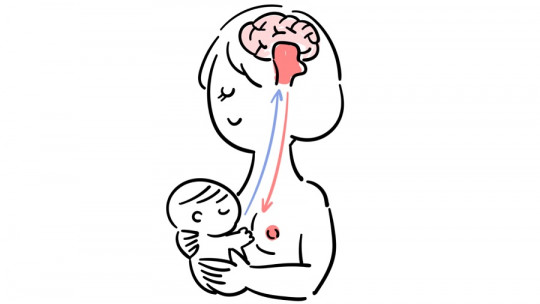
Physical touch has a profound impact on our emotional well-being. From a psychological perspective, physical contact, such as hugging, cuddling, and skin-to-skin contact, triggers the release of hormones such as oxytocin, known as the “love hormone” or “bonding hormone.”. This hormone triggers feelings of trust, calm, and interpersonal connection, which strengthens emotional bonds and promotes a sense of security.
Additionally, physical contact is also linked to reducing levels of the stress hormone cortisol. By receiving physical contact, our body experiences a decrease in cortisol levels, which contributes to the reduction of anxiety, depression and other stress-related symptoms. This reduction in stress can have positive effects on our long-term mental and physical health.
Studies have shown that regular physical contact can improve mental health, promote positive mood, and increase overall feelings of well-being. Even a simple hug can have powerful effects on our emotional health, providing comfort and support in times of need.
In today’s fast-paced and increasingly digital world, the value of physical contact is often underestimated. However, human touch plays a critical role in our emotional and psychological health. Whether it’s a hug, a handshake, or a comforting pat on the back, physical touch can strengthen relationships, reduce stress, and enhance overall well-being.
In this article, we’ll explore why physical contact is so important for emotional well-being, the science behind touch, and how to incorporate more meaningful physical interactions into our lives.
The psychological and emotional importance of physical contact
Human beings are inherently social creatures. From birth, we depend on touch as a way to communicate, bond, and feel connected. Physical contact provides emotional support, promotes trust, and strengthens interpersonal relationships.
Touch plays a crucial role in our emotional health by meeting our basic needs for interpersonal connection and affection. From the moment we are born, physical contact is essential for our emotional development. Babies who receive hugs, cuddles, and skin-to-skin contact experience healthy growth and more robust emotional development.
Throughout life, physical touch remains a powerful way to communicate love, compassion, and support. Displays of physical affection, such as hugs, kisses, and pats on the back, strengthen emotional bonds between friends, family, and romantic partners. These physical interactions are essential to building and maintaining healthy and satisfying relationships.
Physical touch also plays an important role in regulating our emotions. In times of stress, anxiety or sadness, the simple act of receiving a comforting hug can calm our mind, reduce our emotional distress and restore our internal balance. This ability of physical touch to provide comfort and emotional support is invaluable in managing our moods and promoting positive mental health.
Additionally, physical contact connects us to our own humanity and reminds us of our emotional interdependence as social beings. By sharing moments of physical intimacy with others, we feel more connected, valued and understood, which strengthens our self-esteem and sense of belonging.

Psychobiology of physical contact
At the heart of the psychobiology of touch is the release of key hormones that regulate our emotional responses and mood. One of the most prominent neurotransmitters associated with physical touch is oxytocin, commonly known as the “love hormone” or “attachment hormone”.
Oxytocin is released in response to physical contact, especially during hugs, cuddling, and skin-to-skin contact. This hormone triggers feelings of calm, trust, and interpersonal connection, strengthening emotional bonds and promoting a sense of security and well-being.
In addition to oxytocin, physical contact also influences the release of other neurotransmitters and hormones related to emotional well-being. Dopamine and serotonin, for example, are neurotransmitters involved in regulating mood and feelings of pleasure, and are released in response to physical contact, contributing to an overall feeling of happiness and satisfaction.
On a physiological level, physical contact also has significant effects on the activity of the autonomic nervous system. Physical contact reduces the activity of the sympathetic nervous system, responsible for triggering fight-or-flight responses in stressful situations, and increases the activity of the parasympathetic nervous system, which promotes relaxation and restoration of the body. This change in autonomic nervous system activity can result in decreased levels of the stress hormone cortisol, contributing to a feeling of calm and emotional well-being.
The psychobiology of touch reveals the underlying mechanisms that link touch to our emotional well-being. From the release of hormones to the modulation of nervous system activity, physical touch exerts powerful effects on our body and mind, promoting emotional connection, reducing stress and improving our overall health. By understanding these psychobiological processes, we can further appreciate the importance of physical contact in our lives and in our interpersonal relationships.
The Science Behind Physical Contact
The Role of Oxytocin
One of the key biological mechanisms that explain the power of touch is the release of oxytocin, often called the “love hormone.” When we engage in physical contact like hugging or cuddling, our bodies produce oxytocin, which has a calming and bonding effect. Oxytocin reduces stress and fosters feelings of warmth and security.
Touch and the Nervous System
Physical contact also stimulates the parasympathetic nervous system, which is responsible for relaxation and recovery. Touch lowers cortisol levels, a stress hormone, and can slow down the heart rate, promoting a sense of peace and calm.
The Impact on Mental Health
The lack of physical contact can negatively impact mental health. Studies show that people who experience less touch in their lives are more prone to feelings of isolation, anxiety, and even depression. Touch is a simple but powerful way to foster emotional closeness and combat loneliness.
Improved well-being and physical contact
Physical touch has the power to significantly improve our emotional and mental well-being. When we experience physical contact, whether in the form of hugs, caresses or skin-to-skin contact, a series of physiological and emotional responses are triggered that contribute to our overall feeling of happiness and satisfaction.
1. Stress and anxiety reduction
One of the most obvious benefits of physical contact is its ability to reduce stress and anxiety. The release of hormones such as oxytocin and decreased cortisol levels are associated with physical contact, which creates a state of calm and relaxation in our body and mind. This calming effect of physical contact can be especially helpful in times of emotional tension or distress, providing comfort and support when we need it most.
2. Mood improvement
In addition to reducing stress, physical touch can also improve our mood and promote an overall sense of well-being. The release of neurotransmitters such as dopamine and serotonin during physical contact is related to feelings of pleasure and satisfaction, which can elevate our mood and increase our feeling of happiness.

3. Improvement of interpersonal relationships
Physical contact also strengthens our interpersonal relationships and connects us with others in a deeper and more meaningful way. By sharing moments of physical intimacy with friends, family, and loved ones, we build stronger emotional bonds and increase our sense of connection and belonging.
4. Improved physical health
Additionally, physical touch can have beneficial effects on our physical health by strengthening our immune system and promoting healing. Tactile stimulation from physical contact can increase the activity of certain immune response systems, helping us fight illness and recover faster from injury or illness.
Types of physical contact and their effects
It is important to keep in mind that not all physical contact can be understood in the same way, neither in the way it is carried out nor in terms of the results or consequences it has on each person and subjective well-being. Next, we will define different types of physical contact along with the effects they can have depending on the action to which they respond.
1. Hugs
Hugs are a powerful form of physical contact that can have a variety of positive effects on our emotional well-being. A sincere hug can release oxytocin, the love and connection hormone, which promotes feelings of calm, security, and trust. Hugs can also increase the feeling of belonging and strengthen emotional ties between people.
2. Caresses
Gentle, comforting caresses have the power to calm our minds and reduce stress. When we receive caresses, our body releases endorphins, neurotransmitters that act as natural pain relievers and promote a feeling of well-being and relaxation. Cuddling can also increase intimacy and emotional connection between people.
3. Skin-to-skin contact
Skin-to-skin contact, especially between parents and children, has significant benefits for emotional and physical development. This type of physical contact releases oxytocin and strengthens the bond between caregiver and baby, promoting healthy development and a sense of security in the child.
4. Massages
Massages not only relieve muscle tension and promote physical relaxation, but they also have positive effects on our emotional well-being. Massages can reduce cortisol levels and increase the release of neurotransmitters such as serotonin and dopamine, making us feel happier and more relaxed.
5. Social contact
Even unintentional physical contact in social situations, such as a handshake or a touch on the shoulder, can have positive effects on our mood and perception of interpersonal connection. These simple gestures can convey support, empathy and solidarity, strengthening our relationships with others.
Physical contact is a powerful tool to improve emotional well-being. From comforting hugs to simple gestures of affection, its beneficial effects are undeniable. By releasing hormones like oxytocin and reducing stress, it promotes deeper emotional connections and strengthens relationships.
Recognizing and valuing its importance in our lives can improve our mental and physical health, promoting an overall sense of happiness and satisfaction. Incorporating more physical touch into our daily interactions provides us with an invaluable opportunity to connect with others and cultivate healthier, more meaningful relationships.
The Benefits of Physical Contact for Emotional Well-being
Reduces Stress and Anxiety
One of the most well-known benefits of physical contact is its ability to reduce stress. The soothing sensation of touch lowers cortisol levels, which directly reduces anxiety. Even simple acts like holding hands or a pat on the back can help someone feel more relaxed.
Promotes Trust and Bonding
Physical touch is a primary way to build trust and strengthen social bonds. Through touch, we convey empathy, care, and understanding, which fosters closer relationships and a sense of community.
Boosts Mood
Touch stimulates the release of endorphins, the body’s natural feel-good chemicals. These help to elevate mood and promote feelings of happiness and contentment.
Enhances Communication
Non-verbal communication through physical contact can often express what words cannot. Whether it’s comforting someone who is upset or showing affection, touch communicates emotions effectively and strengthens interpersonal connections.
Increases Emotional Resilience
Touch not only helps reduce stress in the moment but can also build emotional resilience over time. Consistent positive physical contact, like receiving hugs or comforting gestures, helps individuals develop a stronger capacity to cope with future stressors.

The Impact of Physical Contact in Different Relationships
Family
Within the family, physical touch serves as a way to express love, protection, and care. From a parent’s embrace to a sibling’s playful push, these interactions are crucial for emotional development and familial bonding.
Friends
Friends who engage in physical contact, such as hugs or pats on the back, tend to feel more emotionally connected. It reinforces trust, support, and understanding in friendships.
Work Environment
While physical contact in the workplace should be approached with care and cultural sensitivity, a handshake or a congratulatory pat on the back can enhance team morale and promote camaraderie. Appropriate touch can help build a more connected and supportive work environment.
The Consequences of Touch Deprivation
Loneliness and Social Isolation
The absence of physical touch can lead to feelings of loneliness and social isolation. During periods of isolation, such as the COVID-19 pandemic, many people experienced the negative effects of “touch deprivation,” which further highlighted the essential role of human contact.
Decline in Mental Health
Touch deprivation has been linked to a decline in mental health, contributing to higher levels of anxiety, depression, and stress. Regular physical contact provides a sense of security and emotional well-being that is difficult to replicate through other means.
How to Incorporate More Physical Contact into Your Life
Hugs with Loved Ones
Make an effort to incorporate more hugs with close family members and friends. A simple hug can greatly enhance emotional well-being for both you and the person you embrace.
Hold Hands
Holding hands with a partner or even a close friend is a subtle yet powerful way to maintain physical contact and foster emotional closeness.
Massage Therapy
If you’re lacking physical contact in your life, consider massage therapy. Not only does it help relieve physical tension, but it also offers the emotional benefits of touch in a professional setting.
Cuddle Therapy
Some people have turned to cuddle therapy, a service where trained professionals provide comforting physical touch in a non-romantic setting. This can be particularly helpful for those experiencing prolonged periods of isolation or loneliness.
Physical contact is a fundamental aspect of human connection that greatly influences our emotional and mental well-being. From reducing stress and anxiety to enhancing communication and fostering trust, touch plays a key role in our interactions and relationships. Incorporating more physical touch into our lives can improve not only our emotional health but also the quality of our social connections.
FAQs
What are the psychological benefits of hugging?
Hugging releases oxytocin, which reduces stress and anxiety, improves mood, and fosters emotional bonding.
How does physical contact affect romantic relationships?
Physical contact like holding hands, kissing, and hugging strengthens intimacy and emotional closeness, improving relationship satisfaction.
Can physical touch help reduce anxiety?
Yes, physical touch lowers cortisol levels, which helps reduce stress and anxiety.
What is touch deprivation?
Touch deprivation refers to the lack of physical contact, which can lead to feelings of loneliness, anxiety, and social isolation.
How can I increase physical contact in my life?
You can increase physical contact by hugging loved ones more often, holding hands with your partner, or even seeking out professional massage therapy.








